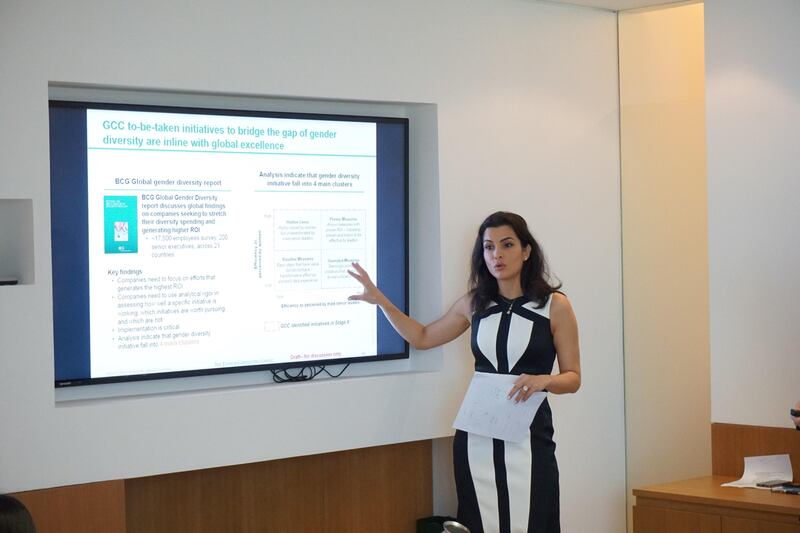Women’s participation in the UAE labour force grew from 34 per cent to 46 per cent between 2000 and 2014 but the increase has been accompanied by a rising female unemployment rate, a new report from The Boston Consulting Group (BCG) shows.
The drop in employment is driven by higher education attainment in the Emirates, according to BCG's How Organisations In The Middle East Can Stretch Their Diversity Spend study, that was not matched by an increase in relevant opportunities.
Gender inequality creates an average global income loss of 13.5 per cent due to gaps in occupational choices and in labour force participation, said BCG. The figure is the lowest in Europe at 10 per cent and highest in the Middle East and North Africa region at 27 per cent.
“To develop and empower the female leaders of tomorrow, CEOs and senior leaders should integrate gender diversity as a core part of the organisation's strategic objectives and ensure organisation-wide communication and engagement. In particular, the commitment of middle management will be critical, as that is who engages every day with employees, and is responsible for performance assessments and promotions,” said Leila Hoteit, a partner and managing director at BCG Middle East.
All GCC countries have seen significant improvement in women’s workforce participation, with large organisations particularly successful in implementing “cutting-edge flexible schemes and arrangement for female employees”, the report said.
However, such initiatives can only work if the right steps are introduced such as flexible working arrangements and inclusive policies.
The study noted that cultural bias still exists in the MIdlde East with women perceived as “unsuitable” for some jobs and regulations can also act as a barrier.
_______________
Read more:
A former US investment banker is on a mission to help women retire rich with robo advice
South Korean cosmetics major targets Muslim women
How women face challenges in the business world
_______________
It also noted that adopting quotas can be a winning strategy, referring to the UAE Cabinet’s decision in 2012 to enact a law requiring listed companies and government agencies to reserve at least 30 per cent of their board seats for women.
The BCG report also recommends six actions to empower the GCC’s female leaders of tomorrow, such as including gender diversity as a strategic objective and ensuring senior leaders and middle managers are on board with such initiatives, as well as ensuring fairness and the removal of conscious or unconscious bias.
The consultancy also highlights the value of female role models in leadership positions, citing the example of the UAE which in October 2008 saw its first female judge sworn in.
Following that appointment, the Dubai Women Establishment noted an increase in applications from Emirati women for this career path.
“The same thing happened following the appointment of the first UAE female jet fighter pilot in 2007, also the first woman in the UAE Air Force to lead a mission abroad in 2014,” the report said.
Another recommendation was fostering high-potential women by removing the stigma associated with flexible working practices by also making them available to male colleagues.
"Retention, advancement and leadership-building are the key areas on which organisations should focus. Applying best practices in retaining talent, ensuring fairness and equal opportunities, removing any conscious or unconscious bias, and promoting role models are the key tools," concluded Ms Hoteit.
According to World Economic Forum’s Human Capital Index, the Mena region only captures 62 per cent of its human capital potential. Closing the gender gap would increase UAE GDP, for example, by over 12 per cent, it estimates.
A July report by Deloitte found women are still largely under-represented on corporate boards, despite continued efforts to improve gender diversity. The study revealed that women hold just 15 per cent of board seats worldwide – figures that were even lower in this region with women holding no more than 2 per cent of seats in the GCC.
Rana Ghandour Salhab, a partner at Deloitte, said a direct correlation was found between female leadership (chief executives and chairs) to board seats held by women. “Organisations with women in the top leadership positions have almost doubled the number of board seats held by women. The inverse is true as well, with gender diverse boards more likely to appoint a female CEO and board chair,” she said.







